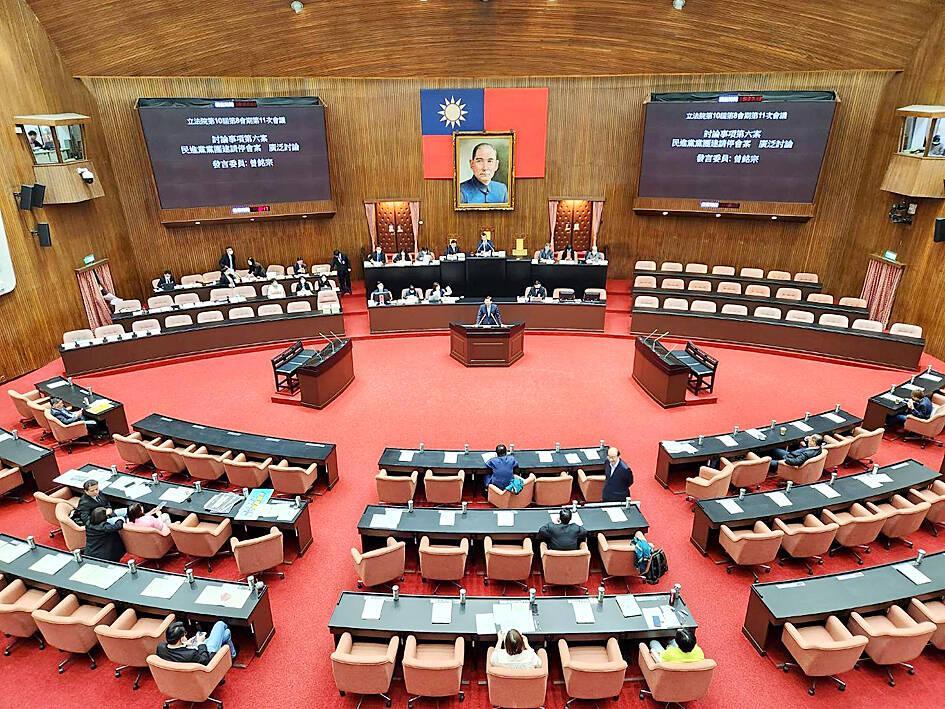Two referendums put forward by opposition lawmakers failed to pass prior to the deadline to be held in August, the Chinese Nationalist Party (KMT) caucus said today.
The KMT and Taiwan People’s Party (TPP) have proposed a combined four referendums.
A question on opposing martial law and another opposing the abolition of the death penalty were put forward by the KMT, while the TPP put forward a question on voting from other districts and another on restarting the recently decommissioned No. 2 nuclear reactor at the Ma-anshan Nuclear Power Plant.

Photo: Taipei Times
The KMT said the referendums on opposing martial law and voting failed to meet the submission deadline due to the Democratic Progressive Party’s (DPP) attempts to block them through long speeches and delaying proceedings, while the DPP said it was due to their vague wording.
The legislature on Friday last week approved the referendum on opposing the death penalty’s abolition, and on Tuesday approved the question on restarting the nuclear reactor.
The referendums on the death penalty and martial law are intended to safeguard the nation’s democratic values, the KMT caucus said in a news release today.
The two referendums would have been voted on by the public on Aug. 23, but missed the deadline and would not be put to a national vote this year.
The DPP is afraid of the people and what the referendums might result in, the KMT said.
The KMT would continue to defend Taiwan’s democracy, it said, adding that it would monitor President William Lai (賴清德) so that he cannot emulate former South Korean president Yoon Suk-yeol, who in December last year declared a short-lived period of martial law.
Given that the KMT and TPP hold a legislative majority, there is no proposal they would not be able to pass, DPP caucus chief executive Rosalia Wu (吳思瑤) said.
The KMT abandoned the martial law referendum, as it did not have public support, was vaguely worded and would not pass scrutiny, Wu said.
The opposition also unilaterally changed the legislative agenda to allow a vote on the TPP’s late-submitted referendum on the nuclear reactor, she added.

A preclearance service to facilitate entry for people traveling to select airports in Japan would be available from Thursday next week to Feb. 25 at Taiwan Taoyuan International Airport, Taoyuan International Airport Corp (TIAC) said on Tuesday. The service was first made available to Taiwanese travelers throughout the winter vacation of 2024 and during the Lunar New Year holiday. In addition to flights to the Japanese cities of Hakodate, Asahikawa, Akita, Sendai, Niigata, Okayama, Takamatsu, Kumamoto and Kagoshima, the service would be available to travelers to Kobe and Oita. The service can be accessed by passengers of 15 flight routes operated by

Alain Robert, known as the "French Spider-Man," praised Alex Honnold as exceptionally well-prepared after the US climber completed a free solo ascent of Taipei 101 yesterday. Robert said Honnold's ascent of the 508m-tall skyscraper in just more than one-and-a-half hours without using safety ropes or equipment was a remarkable achievement. "This is my life," he said in an interview conducted in French, adding that he liked the feeling of being "on the edge of danger." The 63-year-old Frenchman climbed Taipei 101 using ropes in December 2004, taking about four hours to reach the top. On a one-to-10 scale of difficulty, Robert said Taipei 101

Taiwanese and US defense groups are collaborating to introduce deployable, semi-autonomous manufacturing systems for drones and components in a boost to the nation’s supply chain resilience. Taiwan’s G-Tech Optroelectronics Corp subsidiary GTOC and the US’ Aerkomm Inc on Friday announced an agreement with fellow US-based Firestorm Lab to adopt the latter’s xCell, a technology featuring 3D printers fitted in 6.1m container units. The systems enable aerial platforms and parts to be produced in high volumes from dispersed nodes capable of rapid redeployment, to minimize the risk of enemy strikes and to meet field requirements, they said. Firestorm chief technology officer Ian Muceus said

MORE FALL: An investigation into one of Xi’s key cronies, part of a broader ‘anti-corruption’ drive, indicates that he might have a deep distrust in the military, an expert said China’s latest military purge underscores systemic risks in its shift from collective leadership to sole rule under Chinese President Xi Jinping (習近平), and could disrupt its chain of command and military capabilities, a national security official said yesterday. If decisionmaking within the Chinese Communist Party has become “irrational” under one-man rule, the Taiwan Strait and the regional situation must be approached with extreme caution, given unforeseen risks, they added. The anonymous official made the remarks as China’s Central Military Commission Vice Chairman Zhang Youxia (張又俠) and Joint Staff Department Chief of Staff Liu Zhenli (劉振立) were reportedly being investigated for suspected “serious